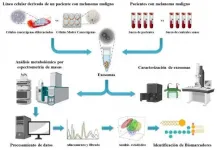(Press-News.org) Fish oil supplements are a billion-dollar industry built on a foundation of purported, but not proven, health benefits. Now, new research from a team led by a University of Georgia scientist indicates that taking fish oil only provides health benefits if you have the right genetic makeup.
The study, led by Kaixiong Ye and published in PLOS Genetics, focused on fish oil (and the omega-3 fatty acids it contains) and its effect on triglycerides, a type of fat in the blood and a biomarker for cardiovascular disease.
"We've known for a few decades that a higher level of omega-3 fatty acids in the blood is associated with a lower risk of heart disease," said Ye, assistant professor of genetics in the Franklin College of Arts and Sciences. "What we found is that fish oil supplementation is not good for everyone; it depends on your genotype. If you have a specific genetic background, then fish oil supplementation will help lower your triglycerides. But if you do not have that right genotype, taking a fish oil supplement actually increases your triglycerides."
Ye's team, including first author and graduate student Michael Francis, examined four blood lipids (fats)--high-density lipoprotein, low-density lipoprotein, total cholesterol and triglycerides--that are biomarkers for cardiovascular disease. The data for their sample of 70,000 individuals was taken from UK Biobank, a large-scale cohort study collecting genetic and health information from half a million participants.
The team divided the sample into two groups, those taking fish oil supplements (about 11,000) and those not taking fish oil supplements. Then they performed a genome-wide scan for each group, testing for 8 million genetic variants to compare. After running over 64 million tests, their results revealed a significant genetic variant at gene GJB2. Individuals with the AG genotype who took fish oil decreased their triglycerides. Individuals with the AA genotype who took fish oil slightly increased their triglycerides. (A third possible genotype, GG, was not evident in enough study volunteers to draw conclusions.)
Determining your genotype is not as far-fetched as it sounds, thanks to direct-to-consumer genetic testing companies. Companies may not report that specific genetic variant yet, but a tech-savvy consumer should be able to download the raw data and look at the specific position to discover the genotype, according to Ye. The ID for the variant is rs112803755 (A>G).
Looking at earlier fish oil studies
The study's findings may also shed light on previous trials, most of which found that fish oil provides no benefit in preventing cardiovascular disease.
"One possible explanation is that those clinical trials didn't consider the genotypes of the participants," Ye said. "Some participants may benefit, and some may not, so if you mix them together and do the analysis, you do not see the impact."
Now that Ye has identified a specific gene that can modify an individual's response to fish oil supplementation, his next step will be directly testing the effects of fish oil on cardiovascular disease.
"Personalizing and optimizing fish oil supplementation recommendations based on a person's unique genetic composition can improve our understanding of nutrition," he said, "and lead to significant improvements in human health and well-being."
INFORMATION:
Co-authors for the study include Yitang Sun and Jingqi Zhou at the University of Georgia; Changwei Li and Xiang Li at Tulane University; and J. Thomas Brenna at Cornell University and the University of Texas at Austin.
Cholinesterase inhibitors are a group of drugs recommended for the treatment of Alzheimer's disease, but their effects on cognition have been debated and few studies have investigated their long-term effects. A new study involving researchers from Karolinska Institutet in Sweden and published in the journal Neurology shows persisting cognitive benefits and reduced mortality for up to five years after diagnosis.
Alzheimer's disease is a cognitive brain disease that affects millions of patients around the world. Some 100,000 people in Sweden live with the diagnosis, which has a profound impact on the lives of both them and their families. Most of those who receive a diagnosis are over 65, but there are some patients ...
Influenza vaccines need to be evaluated every year to ensure they remain effective against new influenza viruses. Will the same apply to COVID-19 vaccines? In order to gauge whether and to what extent this may be necessary, a team of researchers from Charité - Universitätsmedizin Berlin compared the evolution of endemic 'common cold' coronaviruses with that of influenza viruses. The researchers predict that, while the pandemic is ongoing, vaccines will need to undergo regular updates. A few years into the post-pandemic period, however, vaccines ...
Alzheimer's disease seems to progress faster in women than in men. The protein tau accumulates at a higher rate in women, according to research from Lund University in Sweden. The study was recently published in Brain.
Over 30 million people suffer from Alzheimer's disease worldwide, making it the most common form of dementia. Tau and beta-amyloid are two proteins known to aggregate and accumulate in the brain in patients with Alzheimer's.
The first protein to aggregate in Alzheimer's is beta-amyloid. Men and women are equally affected by the first disease stages, and the analysis did not show any differences in the accumulation of ...
How different are men and women's brains? The question has been explored for decades, but a new study led by Rosalind Franklin University neuroscientist END ...
GALVESTON, Texas - A new study conducted at the Galveston National Laboratory at the The University of Texas Medical Branch at Galveston (UTMB) has shown substantial benefit to combining monoclonal antibodies and the antiviral remdesivir against advanced Marburg virus. The study was published today in Nature Communications.
"Marburg is a highly virulent disease in the same family as the virus that causes Ebola. In Africa, patients often arrive to a physician very ill. It was important to test whether a combination of therapies would work better with really sick people, said Tom Geisbert, a professor in the Department of Microbiology & Immunology at UTMB and the principal investigator ...
TROY, N.Y. -- Outsourcing routine tasks, like payroll, customer service, and accounting, offers well-known benefits to businesses and contributes to an economy in which entrepreneurial vendors can support industry and expand employment. However, new research from the Lally School of Management at Rensselaer Polytechnic Institute discovered that not all client-vendor relationships are beneficial for the vendors.
"It's important to observe and study both sides of a business relationship," said T. Ravichandran, a chaired professor of information systems in Lally and an author of a new study published in Information Systems Frontiers. "For businesses to thrive, they need a vibrant vendor community that will support ...
The ocean's mammals are at a crucial crossroads - with some at risk of extinction and others showing signs of recovery, researchers say.
In a detailed review of the status of the world's 126 marine mammal species - which include whales, dolphins, seals, sea lions, manatees, dugongs, sea otters and polar bears - scientists found that accidental capture by fisheries (bycatch), climate change and pollution are among the key drivers of decline.
A quarter of these species are now classified as being at risk of extinction (vulnerable, endangered or critically endangered on the IUCN Red List), with the near-extinct vaquita porpoise and the critically endangered North Atlantic ...
WASHINGTON -- Researchers have developed a new microscopy technique that can acquire 3D super-resolution images of subcellular structures from about 100 microns deep inside biological tissue, including the brain. By giving scientists a deeper view into the brain, the method could help reveal subtle changes that occur in neurons over time, during learning, or as result of disease.
The new approach is an extension of stimulated emission depletion (STED) microscopy, a breakthrough technique that achieves nanoscale resolution by overcoming the traditional diffraction limit of optical microscopes. Stefan Hell won the 2014 Nobel Prize in Chemistry for developing this super-resolution imaging technique.
In Optica, The ...
Serotonin, or 5-hydroxytryptamine (5-HT), is a kind of neurotransmitter. 5-HT can regulate multifaceted physiological functions such as mood, cognition, learning, memory, and emotions through 5-HT receptors. 5-HT receptors are a type of G protein-coupled receptor and can be divided into 12 subtypes in humans. As drug targets, they play a vital role in the treatment of schizophrenia, depression, and migraine.
However, the structural and functional mechanisms of 5-HT receptors have been largely unknown.
In a study published in Nature on March 24, Prof. H. Eric XU and Prof. JIANG Yi from the Shanghai Institute of Materia Medica (SIMM) of the Chinese Academy of ...
Their study has shown that these malignant melanoma vesicles produced by CSCs have a different molecular composition from that of differentiated tumour cells. These molecules were also found to be detectable in exosomes present in the blood, and they presented differences in patients with malignant melanoma compared to healthy individuals. This makes them potentially suitable as biomarkers for the diagnosis and prognosis of this disease.
The results have been published in the prestigious scientific journal Molecular Oncology.
Malignant melanoma is one of the most aggressive types of skin cancer and its prevalence has been increasing worldwide in recent years. Among the factors that contribute to the life-threatening nature and ...


